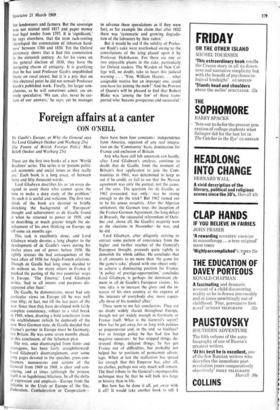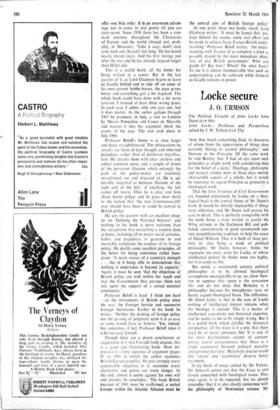Foreign affairs at a canter
CON O'NEILL
These are the first two books of a new 'World Realities' series. The series is to 'present politi-
cal, economic and social issues as they really are:. Each book is a long essay, of between forty and fifty thousand words.
Lord Gladwyn describes his as 'an essay de- signed to assist those who cannot spare the time to make a deep study of the problem.'
As such it is useful and welcome. The first two thirds of the book are devoted to briefly sketching the background of 'European' thought and achievement as de Gaulle found it when he returned to power in 1958, and to describing at much greater length the de- velopment of his own thinking on Europe up till some six months ago.
This task is excellently done; and Lord Gladwyn wisely devotes a long chapter to the development of de Gaulle's views during his twelve years out of power before 1958. He rightly stresses the bad consequences of the Suez affair of 1956 for Anglo-French relations.
Though de Gaulle had long since decided to do without us, for many others in France it
marked the parting of the two countries' ways in Europe. 'The Entente,' Lord Gladwyn .writes, 'had to all intents and purposes dis- appeared after Suez.'
De Gaulle, he demonstrates, never had any particular views on Europe till he was well
over fifty; in fact, not till the last years of the
war. Since then they have developed with fairly complete consistency, subject to a vital break in 1949, when, drawing a bold conclusion from the establishment (which he deplored) of the new West German state, de Gaulle decided that France's partner in Europe must be Germany, not Britain. He was some seven months ahead, in this conclusion, of the Schuman plan.
The rest, once disentangled from feints and stratagems, has been fairly straightforward. Lord Gladwyn's disentanglement, over some sixty pages devoted to the speeches, press con- ferences, manoeuvres and actions of the General from 1949 to 1968, is clear and con- vincing, and at times (although the process itself is so lugubrious) hilarious. In all the shifts of expression and emphasis—Europe from the Atlantic to the Urals or Europe of the Six; Federation, Confederation or Cooperation—
there have been four constants: independence from America, rejection of any real integra- tion on the `Community' basis, domination for France and exclusion of Britain.
Any who have still felt uncertain can hardly, after Lord Gladwyn's analysis, continue to doubt that de Gaulle, from the moment of Britain's first application to join the Com- munities in 1961, was determined to keep us out if he could; or fail to see that the Nassau
agreement was only the pretext, not the cause, of the veto. The question for de Gaulle, as 1962 proceeded, was only: was he strong enough to do the trick? But 1962 turned out to be his annus mirabilis. After the Algerian
settlement, the German tour, the inception of the Franco-German Agreement, the long delays in Brussels, the successful referendum of Octo- ber and, above all, the Gaullist majority won at the elections in November—he was, and he did.
Lord Gladwyn, after diligently striving to extract some pattern of consistency from the higher and further reaches of the General's European thought, proceeds quite rightly to demolish the whole edifice. He concludes that it all amounts to no more than `the game for the game's sake,' played with one object only : to achieve a dominating position for France. 'A policy of prestige-opportunism,' concludes Lord Gladwyn, is perhaps the dominant ele- ment in all de Gaulle's European visions: his 'one idea is to increase the glory and the in- terests of his own country at the expense of the interests of everybody else, more especi- ally those of his nominal allies.'
These seem to me fair conclusions. They are no doubt widely shared throughout Europe. though not yet widely enough in Germany or France itself. What is the General's secret? How has he got away for so long with policies so preposterous and, in the end, so fruitless?
For in foreign policy he has had few but negative successes: he has stopped things, de- stroyed things, delayed things; he has got France out of difficulties, but probably not helped her to positions of permanent advan- tage. When at last the realisation has spread far enough that this Emperor has, after all, no clothes, perhaps not very much will remain. The final tribute to the General's incomparable technique may be that he will bulk less large in history than in life.
But how has he done it all, got away with it all? It would take another book to tell. 1 offer one hint only: it is an enormous advan- tage not to come to real power till you are sixty-seven. Since 1958 there has been a con- stant murmur throughout the Chanceries of Europe and the world (though not, prob- ably, in Moscow): `Take it easy; don't stick your neck out; he can't last long.' He has lasted nearly eleven years. Add his first innings just after the war and he has already reigned longer than Hitler did.
This is a useful book, all the better for being written at a canter. But in the last quarter of it, as Lord Gladwyn begins to leave de Gaulle behind and to ride off on some of his own current hobby-horses, the pace grows hotter and everything gets a bit slapdash. The whole book could have done with a bit more revision. I noticed at least three wrong dates. In each case, I admit, only one year out; but it does matter. As the author gallops through 1967 he produces, in July, a visit to London by Messrs Pompidou and Couve de Murville and weaves it into his argument about the events of the year. The visit took place in July 1966.
Professor Beloff's theme is at once larger and more straightforward. The obfuscations he attacks are those of-lazy thought and inherited prejudices, rather than of deliberate mystifica- tion. He attacks them with clear analysis and robust common sense; and a couple of dozen of the persistent illusions which entangle the path of the policy-maker are resolutely straightened out and disposed of. He is ad- mirably impartial as between illusions of the right and of the left: if anything, the left comes off worse. Thus he is clear and firm about Soviet policy; and he gives short shrift to the notion that 'the new Commonwealth' ever should have been or could be central to British policy.
He sets the pattern with an excellent chap- ter on 'Defining the National Interest'; and nothing in his book is more welcome than the recognition that everything a country does at home, including all its major social attitudes, habits and prejudices, is germane to and inevitably conditions the conduct of its foreign policy. He distills some excellent principles, all the better for being sometimes rather hum- drum. 'A main source of a country's strength . . . lies in it being able to demonstrate that nothing it undertakes is beyond its capacity.' Again, it must be seen 'that the objectives of British policy are well within her reach and that the Government that pursues them can rely upon the support of a united national community.'
Professor Beloff is hard—I think too hard —on the instruments of British policy since the war, the Foreign Service and successive Foreign Secretaries. Earlier in his book he writes: 'Neither the making of foreign policy nor the passing of judgment upon it is as easy as some would have us believe.' Yes, indeed; but sometimes. I feel, Professor Beloff takes it a bit too easy himself.
Though there are a dozen conclusions or suggestions in it that I would hotly dispute, this is a good and illuminating book. Most im- pressive is a long sequence of argument (pages 85 to 109) in which the author examines British European policy. He puts strongly every conceivable objection to it, examines every alternative and points out every danger. In the end, almost it seems against his own will and instinct, he concludes: 'The basic British decision of 1961 must be reaffirmed; a united Europe within the Atlantic Alliance must be the central aim of British foreign policy.'
At one point these two books touch. Lord Gladwyn writes: 'It must be hoped that, per- haps behind the scenes, some real effort will be made to achieve basic Franco-British under- standing.' Professor Beloff writes: 'An under- standing with France of as complete a kind as possible should be the most immediate objec- tive of any British government.' Who can doubt it? But how? When? On what basis? To me it is almost inconceivable that such an understanding can be achieved while General de Gaulle remains in power.











































 Previous page
Previous page